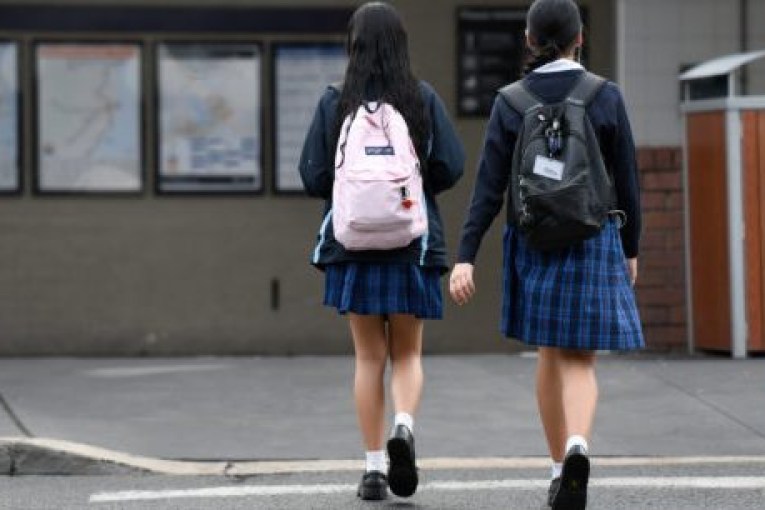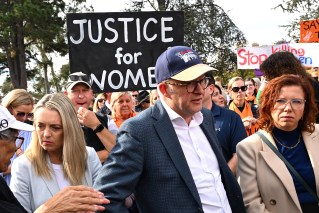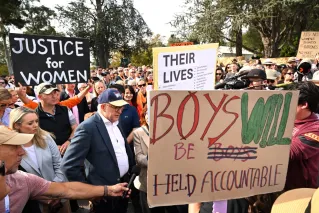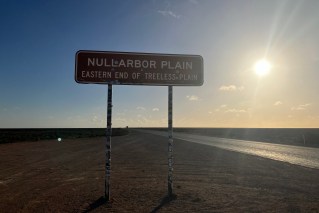Hardly poetry in motion, but Albanese’s backflip can still work if he sticks the landing
Dennis Atkins gives the prime minister a D- for his poetic sales job but Anthony Albanese and Jim Chalmers get an A for the policy backflip on Scott Morrison’s big boy tax cuts.


Australian Prime Minister Anthony Albanese is seen prior to the Men’s Singles final between Jannik Sinner of Italy and Daniil Medvedev of Russia on Rod Laver Arena on Day 15 of the 2024 Australian Open at Melbourne Park in Melbourne, Sunday, January 28, 2024. (AAP Image/James Ross)
Former New York Democrat Governor and one time presidential aspirant Mario Cuomo said almost 40 years ago about politicians: “You campaign in poetry, you govern in prose”.
True then, still true, this remark illustrates the shortcomings and potential of politics through the ages.
We should add a third way, the kind of campaigning and governing Anthony Albanese practices. It’s hard to say what it is but you can safely say it’s neither poetic nor prosaic.
The prime minister might have been roundly booed by spectators at Sunday night’s men’s Australian Open final but that was unlikely to have been a commentary on Albanese’s campaigning or poetry skills. Maybe the people in the crowd just think they’ve had enough of him, at least for now. The famed prime ministerial mojo is clearly still missing in action.
Albanese demonstrated in the 2022 election campaign the poetic quality he brought to that contest was closer to 70s British punk ranter Atilla the Stockbroker than Australian urban story weaver Paul Kelly.
Albanese could mangle economic numbers, talk himself into self-serving riddles that all ended with a trip down memory avenue to public housing and a single mum.
What he couldn’t do was tell a story about the condition of the country or where he wanted things to go, what were the points of departure and the destination of fairness, equality and a shared prosperity. He still can’t. His mind locks onto and never gets past his mantra from that 2022 campaign. “No one held back, no one left behind,” Albanese intoned like a Byzantine liturgist doing Vespers.
Putting aside quibbling over how he delivered his January 25 national press club speech – and the general inarticulate nature of his prime ministership – Albanese did announce a significant policy move, radically adjusting the cruelly skewed “stage three” tax cuts – cuts designed by rich men for rich men.
After more than a year dithering, backsliding and shoe inspecting, Albanese gave in to the inevitable and backflipped on a much repeated pledge not to touch the tax cuts which included a $157 billion bonus over a decade for taxpayers earning in excess of $180,000.
We can only imagine what the political scene throughout 2023 would have been like if Albanese had not squashed the conversation his treasurer Jim Chalmers wanted to start following the government’s first budget in October, 2022.
The government would have had a substantial policy battle which might have overtaken or, at least, complemented, the poorly conceived, handled and executed debate over the “Indigenous Voice to Parliament” debate.
The 2023 political year could have had more depth to it. An economic debate centred on the equity and fairness of the tax cuts – which were always an outrageous giveaway to high income earners – could have been just the conversation of an otherwise often distracted prime minister.
This would have dispensed with the broken promise debate after the necessary but performative motions.
Things might have also been different if Albanese had picked up Chambers’ next suggestion – which was all ready to roll in late September last year – to do what was done last week in the days after the failed Voice referendum.
But we are where we are. Many Australian voters, particularly the lower and middle income earners on the losing end of the big bucks tax cuts scale designed by former treasurer Scott Morrison, have long expected a Labor Government would reverse the 2019 decision.
After all, it was not just ridiculously generous to those in the top income brackets, it was also conceived half a decade before the policy was implemented.
It’s the policy equivalent of deciding to buy a $1.25 million house five years before you had wage stagnation, carried household debt burdened with galloping interest rates and an uncertain future.
It was always a nonsense proposition.
Those who argue this is a mortal political sin which will bring down opprobrium fail to appreciate political history.
John Howard, one of the great back flippers of Australian politics, had a simple rule for changing his mind about policy.
“It’s not the back flip that matters, it’s where you land,” Howard would tell colleagues and others.
“If the public are happy with where you end up, you’ll be fine. You might lose a bit of paint but it’s nothing against what you might lose sticking with an unpopular policy.”
That’s the thing about this policy switch. It makes easy, contestable and winnable political sense.
Just as the LNP is fighting on two fronts at the next election – trying to win and hold seats held by or under threat from Labor in the outer suburbs and the regions, but also needing to claw back at least some of the formerly blue riband seats taken by the teals – Labor had its own other front: the Greens Party.
The Greens have three major policy positions to base a defensive and offensive fight with Labor on: climate and resources, housing and rents and the now jettisoned big dollar tax cuts.
Labor can have a soundly-based fight on climate and resources even though they won’t be able to match the absolutist stand of the Greens. They are, however, better placed than they have been since the 2007 poll.
Economic and tax policy was looming as another matter which is why Albanese had to change his mind.
The challenge now is to follow through, to stay the course and make sure the basic structure of the package Chalmers delivered to Cabinet sticks through the Senate.
There are enough supports, especially the increase in the Medicare levy threshold and the pledge to review the effective marginal tax rates women face, to round out the package and give politicians plenty to talk about.
Labor now has two solid stories on which to base a sales pitch to voters. The economic story, based on the tax cuts for all, greater access to health care, child care and other welfare measures demonstrate this is a government with a heart and a soul.
Also, Tony Burke’s workplace changes – giving greater equity and wage fairness to the lower paid and many in insecure and vulnerable jobs – are further proof the federal government is under new management.
Employers might hate Burke’s reforms but workplace fairness has been a missing middle for public policy. Watch a Deliveroo guy riding a bike through the rain with someone’s dinner on the back or an Uber driver scrambling to make a decent wage in juggled shifts.
At a time when the gig economy is becoming the norm and not just an exotic exception, these changes matter.
They make people’s lives better and that’s what governments are supposed to do.












